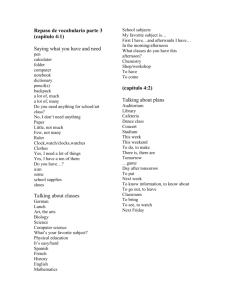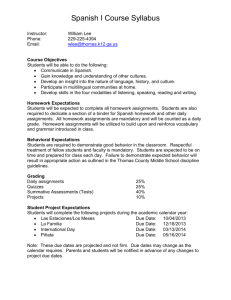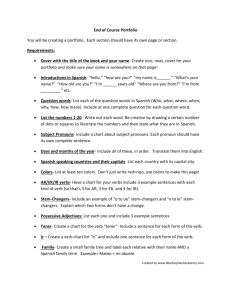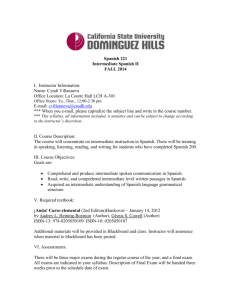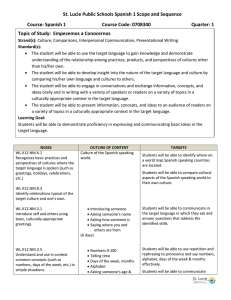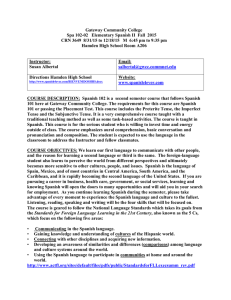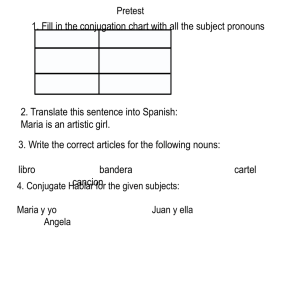Mid-Term_Study_Guide
advertisement
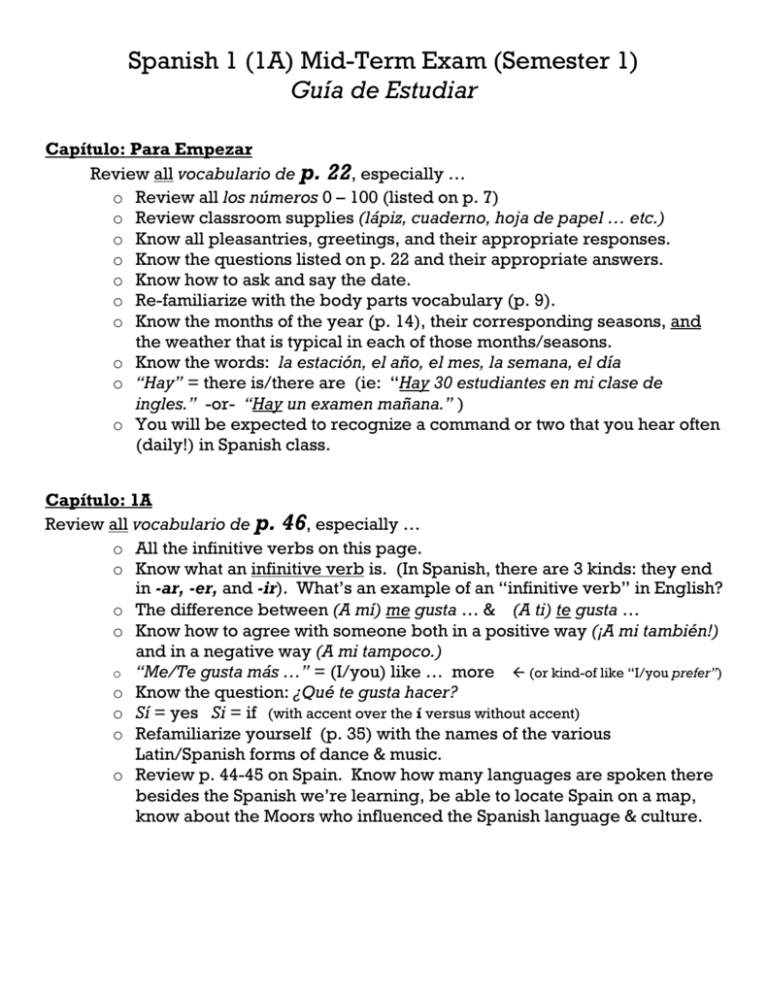
Spanish 1 (1A) Mid-Term Exam (Semester 1) Guía de Estudiar Capítulo: Para Empezar Review all vocabulario de p. 22, especially … o Review all los números 0 – 100 (listed on p. 7) o Review classroom supplies (lápiz, cuaderno, hoja de papel … etc.) o Know all pleasantries, greetings, and their appropriate responses. o Know the questions listed on p. 22 and their appropriate answers. o Know how to ask and say the date. o Re-familiarize with the body parts vocabulary (p. 9). o Know the months of the year (p. 14), their corresponding seasons, and the weather that is typical in each of those months/seasons. o Know the words: la estación, el año, el mes, la semana, el día o “Hay” = there is/there are (ie: “Hay 30 estudiantes en mi clase de ingles.” -or- “Hay un examen mañana.” ) o You will be expected to recognize a command or two that you hear often (daily!) in Spanish class. Capítulo: 1A Review all vocabulario de p. 46, especially … o All the infinitive verbs on this page. o Know what an infinitive verb is. (In Spanish, there are 3 kinds: they end in -ar, -er, and -ir). What’s an example of an “infinitive verb” in English? o The difference between (A mí) me gusta … & (A ti) te gusta … o Know how to agree with someone both in a positive way (¡A mi también!) and in a negative way (A mi tampoco.) o “Me/Te gusta más …” = (I/you) like … more (or kind-of like “I/you prefer”) o Know the question: ¿Qué te gusta hacer? o Sí = yes Si = if (with accent over the í versus without accent) o Refamiliarize yourself (p. 35) with the names of the various Latin/Spanish forms of dance & music. o Review p. 44-45 on Spain. Know how many languages are spoken there besides the Spanish we’re learning, be able to locate Spain on a map, know about the Moors who influenced the Spanish language & culture. Capítulo: 1B Review all vocabulario de p. 70, especially … o All the adjectives. You should also know what an adjective is. o Know all about how adjectives often (but not always) change between a masculine and a feminine version. o Know which adjectives do not change between masculine and feminine. o “Yo soy …” = I am; “Tú eres …” = You are…; “El/Ella es …” = He/She is … o Know what the questions: ¿Cómo soy yo? ¿Cómo eres tú? and ¿Cómo es él/ella? are asking. Know how to answer such questions. o Know the 2 definite articles presented in this chapter: el / la and what they mean. o Know the 2 indefinite articles presented in this chapter: un / una and what they mean. o Remember “a veces” = sometimes Capítulo: 2A Review all vocabulario de p. 96, especially … o Everything about classes, school schedule words, etc. o The ordinal numbers (1st – 10th) o Be able to describe a class with an adjective or two on p. 96. o ¿Quién? = who? o Know what pronouns are. Know the Spanish pronouns on p. 82. o Know how to conjugate a basic –ar verb (see p. 84). You should be able to provide the correct conjugated form of an infinitive verb if given the pronoun. (ie: ella ______ [hablar] = ella habla ) o (Yo) tengo = I have; (tú) tienes = you have POR LO GENERAL … For vocabulary words that are NOUNS … you should be familiar with the gender of the noun (whether it is a feminine or masculine noun.) The mid-term is all Scan-tron (T/F and multiple choice questions only). For 6th grade, the mid-term is worth 5% of their 1st semester grade. For 7th & 8th grades, the mid-term is worth ___ of their 1st semester grade. There is a listening part of this test with 5 multiple choice questions. You will be listening to answering machine messages where the callers are trying to be “matched up” with a date for the Homecoming dance. The callers state one thing they like to do and one thing they do not like to do. You will see 3 pictures for each caller. Your job will be to choose the picture that represents what the caller has said he/she likes to do.

